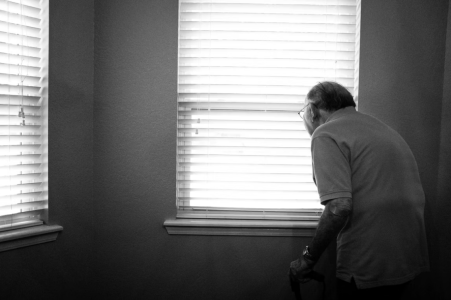100 residents forced out as nursing home bankruptcy sparks fear among seniors
- Replies 0
Anxiety is sweeping through families in Gardendale, Alabama, after news broke that Magnolia Ridge, a long-standing 148-bed nursing home, will close by October 15.
Nearly 100 residents have already been forced to leave the facility, uprooted from their familiar routines and the caregivers they trusted.
The shutdown comes just months after its parent company, Genesis HealthCare, filed for bankruptcy in July—a financial unraveling that has cast uncertainty over hundreds of facilities nationwide.
For seniors, the fear isn’t just about moving; it’s about the disruption of care in a stage of life where stability means everything.
The closure is considered a rare step in the world of nursing homes, where regulators often attempt to keep doors open through emergency funding and oversight to avoid chaos.
Closing such facilities is generally seen as a last resort, precisely because of the devastating consequences for residents.
According to officials, the Centers for Medicare and Medicaid Services (CMS) had warned as early as March that Magnolia Ridge might lose its federal certification.
A judge in the case, however, questioned whether the shutdown was necessary, pointing out that a court-appointed watchdog had found the facility was providing “satisfactory care.”
The tension reflects the difficult balance between accountability and compassion in an industry already stretched thin.
Despite some assurances, Magnolia Ridge’s history paints a more complicated picture. Lawyers representing residents in personal-injury lawsuits highlighted the fact that CMS repeatedly gave the home one out of five stars from 2017 to 2024.

Reports showed that staff spent significantly less time with patients than the national average, a red flag for families who depend on skilled attention.
Advocates argue that while some residents may have received adequate care, others endured neglect, and those disparities shouldn’t be overlooked. For families who trusted Magnolia Ridge, these conflicting narratives only deepen their worry.
At the center of the storm is Genesis HealthCare, the third-largest skilled nursing facility operator in the country, with over 20,000 licensed beds across 18 states.
The company’s bankruptcy filing, driven by $8 million a month in lawsuits related to alleged negligence and wrongful deaths, reflects just how fragile the economics of elder care have become.
Rising labor costs, expensive drugs, and mounting supply bills have battered the balance sheets of providers across the nation.
Also read: Looking beyond assisted living? Here are 8 care alternatives worth exploring
Genesis executives admitted the company had been “mired in corporate inefficiencies” but insisted that resident care would not be compromised.
The closure in Alabama, however, suggests otherwise—at least for the seniors who are now scrambling to find new homes. The company has vowed to appeal CMS’s decisions while complying with transfer orders for now.
In a statement, Genesis stressed that Magnolia Ridge “remains firmly committed to providing our residents with quality skilled nursing care” and is “working collaboratively with state and federal agencies” during the transition.
Regulators temporarily blocked CMS from pulling the facility’s Medicare and Medicaid agreements, but residents remain in limbo as the clock ticks toward October 15.
Families are left juggling paperwork, transport, and the painful process of explaining to their loved ones why their home is suddenly disappearing.
Also read: Assisted living qualifications: What to expect and who it’s designed for
For the elderly, especially those with dementia or mobility issues, such abrupt changes can be traumatic. Magnolia Ridge isn’t an isolated case but a sign of deeper strain across America’s long-term care system.
Earlier this year, a healthcare giant closed hospitals and clinics under bankruptcy protection, and countless smaller facilities continue to buckle under financial pressure.
Each closure leaves families facing impossible choices—and seniors at risk of being shuffled between homes that may or may not have space.
Advocates worry that if systemic reforms don’t come soon, the country could see more abrupt shutdowns, jeopardizing the most vulnerable members of society.
For now, Magnolia Ridge’s story serves as a stark reminder of what’s at stake when elder care collides with corporate collapse.
Read next: CVS expands program to help Medicare members avoid costly hospital readmissions

Would you feel secure placing a loved one in a nursing home after seeing closures like this? Share your thoughts in the comments—we want to hear from you.
Nearly 100 residents have already been forced to leave the facility, uprooted from their familiar routines and the caregivers they trusted.
The shutdown comes just months after its parent company, Genesis HealthCare, filed for bankruptcy in July—a financial unraveling that has cast uncertainty over hundreds of facilities nationwide.
For seniors, the fear isn’t just about moving; it’s about the disruption of care in a stage of life where stability means everything.
The closure is considered a rare step in the world of nursing homes, where regulators often attempt to keep doors open through emergency funding and oversight to avoid chaos.
Closing such facilities is generally seen as a last resort, precisely because of the devastating consequences for residents.
According to officials, the Centers for Medicare and Medicaid Services (CMS) had warned as early as March that Magnolia Ridge might lose its federal certification.
A judge in the case, however, questioned whether the shutdown was necessary, pointing out that a court-appointed watchdog had found the facility was providing “satisfactory care.”
The tension reflects the difficult balance between accountability and compassion in an industry already stretched thin.
Despite some assurances, Magnolia Ridge’s history paints a more complicated picture. Lawyers representing residents in personal-injury lawsuits highlighted the fact that CMS repeatedly gave the home one out of five stars from 2017 to 2024.

100 residents forced out as nursing home bankruptcy sparks fear among seniors. Image source: Alex Boyd / Unsplash
Reports showed that staff spent significantly less time with patients than the national average, a red flag for families who depend on skilled attention.
Advocates argue that while some residents may have received adequate care, others endured neglect, and those disparities shouldn’t be overlooked. For families who trusted Magnolia Ridge, these conflicting narratives only deepen their worry.
At the center of the storm is Genesis HealthCare, the third-largest skilled nursing facility operator in the country, with over 20,000 licensed beds across 18 states.
The company’s bankruptcy filing, driven by $8 million a month in lawsuits related to alleged negligence and wrongful deaths, reflects just how fragile the economics of elder care have become.
Rising labor costs, expensive drugs, and mounting supply bills have battered the balance sheets of providers across the nation.
Also read: Looking beyond assisted living? Here are 8 care alternatives worth exploring
Genesis executives admitted the company had been “mired in corporate inefficiencies” but insisted that resident care would not be compromised.
The closure in Alabama, however, suggests otherwise—at least for the seniors who are now scrambling to find new homes. The company has vowed to appeal CMS’s decisions while complying with transfer orders for now.
In a statement, Genesis stressed that Magnolia Ridge “remains firmly committed to providing our residents with quality skilled nursing care” and is “working collaboratively with state and federal agencies” during the transition.
Regulators temporarily blocked CMS from pulling the facility’s Medicare and Medicaid agreements, but residents remain in limbo as the clock ticks toward October 15.
Families are left juggling paperwork, transport, and the painful process of explaining to their loved ones why their home is suddenly disappearing.
Also read: Assisted living qualifications: What to expect and who it’s designed for
For the elderly, especially those with dementia or mobility issues, such abrupt changes can be traumatic. Magnolia Ridge isn’t an isolated case but a sign of deeper strain across America’s long-term care system.
Earlier this year, a healthcare giant closed hospitals and clinics under bankruptcy protection, and countless smaller facilities continue to buckle under financial pressure.
Each closure leaves families facing impossible choices—and seniors at risk of being shuffled between homes that may or may not have space.
Advocates worry that if systemic reforms don’t come soon, the country could see more abrupt shutdowns, jeopardizing the most vulnerable members of society.
For now, Magnolia Ridge’s story serves as a stark reminder of what’s at stake when elder care collides with corporate collapse.
Read next: CVS expands program to help Medicare members avoid costly hospital readmissions
Key Takeaways
- Magnolia Ridge, a 148-bed nursing home in Alabama, is closing after Genesis HealthCare’s bankruptcy, forcing out 100 residents.
- Regulators say the closure was long in the making, but families and a bankruptcy judge questioned whether it was necessary.
- Genesis faces $8 million in monthly lawsuit costs, part of a broader financial crisis in the nursing home industry.
- Advocates warn that abrupt shutdowns can traumatize seniors, underscoring the urgent need for systemic elder care reform.






